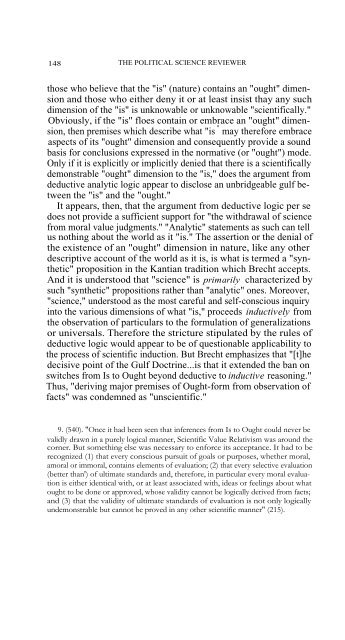ARNOLD BRECHT'S POLITICAL THEORY REVISITED Political ...
ARNOLD BRECHT'S POLITICAL THEORY REVISITED Political ...
ARNOLD BRECHT'S POLITICAL THEORY REVISITED Political ...
You also want an ePaper? Increase the reach of your titles
YUMPU automatically turns print PDFs into web optimized ePapers that Google loves.
148<br />
THE <strong>POLITICAL</strong> SCIENCE REVIEWER<br />
those who believe that the "is" (nature) contains an "ought" dimension<br />
and those who either deny it or at least insist thay any such<br />
dimension of the "is" is unknowable or unknowable "scientifically."<br />
Obviously, if the "is" floes contain or embrace an "ought" dimension,<br />
then premises which describe what "is " may therefore embrace<br />
aspects of its "ought" dimension and consequently provide a sound<br />
basis for conclusions expressed in the normative (or "ought") mode.<br />
Only if it is explicitly or implicitly denied that there is a scientifically<br />
demonstrable "ought" dimension to the "is," does the argument from<br />
deductive analytic logic appear to disclose an unbridgeable gulf between<br />
the "is" and the "ought."<br />
It appears, then, that the argument from deductive logic per se<br />
does not provide a sufficient support for "the withdrawal of science<br />
from moral value judgments." "Analytic" statements as such can tell<br />
us nothing about the world as it "is." The assertion or the denial of<br />
the existence of an "ought" dimension in nature, like any other<br />
descriptive account of the world as it is, is what is termed a "synthetic"<br />
proposition in the Kantian tradition which Brecht accepts.<br />
And it is understood that "science" is primarily characterized by<br />
such "synthetic" propositions rather than "analytic" ones. Moreover,<br />
"science," understood as the most careful and self-conscious inquiry<br />
into the various dimensions of what "is," proceeds inductively from<br />
the observation of particulars to the formulation of generalizations<br />
or universals. Therefore the stricture stipulated by the rules of<br />
deductive logic would appear to be of questionable applicability to<br />
the process of scientific induction. But Brecht emphasizes that "[t]he<br />
decisive point of the Gulf Doctrine...is that it extended the ban on<br />
switches from Is to Ought beyond deductive to inductive reasoning."<br />
Thus, "deriving major premises of Ought-form from observation of<br />
facts" was condemned as "unscientific."<br />
9. (540). "Once it had been seen that inferences from Is to Ought could never be<br />
validly drawn in a purely logical manner, Scientific Value Relativism was around the<br />
corner. But something else was necessary to enforce its acceptance. It had to be<br />
recognized (1) that every conscious pursuit of goals or purposes, whether moral,<br />
amoral or immoral, contains elements of evaluation; (2) that every selective evaluation<br />
(better than') of ultimate standards and, therefore, in particular every moral evaluation<br />
is either identical with, or at least associated with, ideas or feelings about what<br />
ought to be done or approved, whose validity cannot be logically derived from facts;<br />
and (3) that the validity of ultimate standards of evaluation is not only logically<br />
undemonstrable but cannot be proved in any other scientific manner" (215).
















